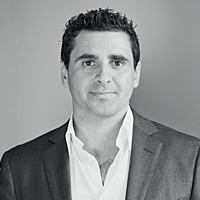Your love affair with dividends and property is hurting your returns
Earlier this year, I received an email from a reader in response to an article singing the praises of the dividends on offer in the local market. The reader took specific exception to the opening line of the article.
"No matter your age, market experience, or life goals, one thing every investor loves is a dividend."
His view was that Australians' love affair with dividends has caused them to do poorly as a group and they would be better served dropping the home bias. Controversial? Perhaps!
However, it turns out the reader is also a Partner at Koda Capital, one of Australia's top-tier financial advice firms, so it was coming from a seasoned wealth manager.

I set up a call with the adviser and he agreed to share his perspectives in a Meet the Adviser interview. Even if you aren't going to kick your home bias I think you'll find his passion and candid views on investing well worth reading.
Enjoy.
- Name: Sebastian “Seb” Ferrando
- Age: I’m kinda old…..52
- Current firm: Koda Capital
- Investment goals: For me personally? Flat-out all growth, all the time. For my clients? The best risk-adjusted return possible that charts the smoothest path they can live with. Plus, that takes their current balance sheet into account, as well as their financial and family goals. That’s different for everyone.
- Products used: ETFs and funds that deliver differentiated exposures
- Biggest portfolio holding: Different for everyone but for me, it’s the S&P 500 in the US.

Why did you choose this profession and how did you get started as a financial adviser?
I’m that annoying little jerk who was 14 years old and knew EXACTLY what he wanted to do for a living. In high school, I wanted to do 3-unit economics for my HSC (remember that??).
Then I wanted to study Economics and Finance at uni (went to UNSW and did that). Then I wanted to move to New York and work in finance at the centre of global capital markets (did that during 2008…that was fun!).
That was my first gig in financial advice. I’d done all kinds of finance before that, including foreign exchange, but in 2008 I joined Bernstein (now known as AllianceBernstein) which was famous for taking people they thought were skilled, training them up their way, and then letting them loose.
What do you believe makes you different from other advisers? Do you have a particular specialty or unique approach?
A few things. Firstly, I believe in the global approach. Too often I see SMSF statements that are 100% Aussie shares. That’s a huge mistake, there’s a massive amount of return left on the table.
Secondly, I default to actively managing ETFs unless a fund can genuinely demonstrate the ability to deliver something unique. I’m not using a fund to try to beat the ASX 200 or the S&P 500, for example, that’s a complete waste of time.
Thirdly, asset classes have roles - so be disciplined and use that asset class in that role. Aussie stocks are a great example. They’ve gone sideways for 16 years so don’t use them for growth, you won’t get any. Use them for incredible access to tax-effective income.
Lastly, aligning the data pieces with the goals and the family pieces is where the rubber meets the road. You can get everything else right but if the goals and family pieces aren't right, you likely blew it.
Actually, one other thing – I always consider the entire client balance sheet when deploying assets, not just the bucket of assets the client asked me to look after.
Can you tell me about your process for building portfolios and selecting investment products?
Different asset classes do different things and advisers should deliberately allocate capital accordingly when building portfolios.
- You want income? Let’s target franked Australian dividends for that part of the portfolio.
- You want growth? We’re going to the US.
- You want stable income? Let’s look at private credit and fixed income.
The one thing I’m NOT going to do is call clients with individual stock ideas.
Those portfolios never hang together, never work towards a goal, and importantly, almost never perform.
When people say that they feel like the stock market is gambling, this is almost always why – this IS gambling.
Can you share two of your “go-to” funds with us?
Having worked in the US for 18 years (and across 5 other countries over the rest of my career), it taught me something important – every country has home-country bias.
Every single one (BTW, every country thinks it’s the best country in the world too). But only one country can afford home country bias - the US. Literally no one else.
With that as the backdrop, I think that every portfolio should centre its equity exposure in the US so my two go-to options are…..ready??..... iShares S&P 500 ETF (ASX: IVV) and BetaShares NASDAQ 100 ETF (ASX: NDQ).
That’s right – the ETFs that mimic the S&P 500 and the Nasdaq. Boring, right?? And if you want to hedge the Aussie dollar out, use iShares S&P 500 (AUD Hedged) ETF (ASX: IHVV) and BetaShares NASDAQ 100 ETF - Currency Hedged (ASX: HNDQ).
We all know how far the US markets are in front of the ASX 200 this year but even over the 10 years that ended in 2022, the S&P 500 was up 12.5% total return per year. The Nasdaq was up 15.5%. The ASX 200? Just 8.6%, total return, including dividends.
There aren’t enough franking credits in the world to make up that gap.
How do you discover new managers and investment opportunities in a market saturated with products and issuers? What makes a manager stand out?
I’m very fortunate to have the best Investment Strategy Group in the business at Koda Capital. They do almost all of the hard yards on making sure that on behalf of our clients, I have the profession’s best palate from which to select. They travel all over the world and get access to unique options that are diversifying, that smooth the ride, and that deliver the risk-adjusted returns our clients expect.
In the ETF space, having spent almost 20 years in the US which is the beating heart of the ETF business, I’ve been exposed in a unique way to different options for different exposures. The ideas that stand out always do what they said they were going to do. Then, you can confidently predict the return pattern of the portfolio you just constructed.
How would you describe your personal investment strategy?
For clients, it’s crafting a portfolio of individual investments that go up over time but not always at the same time. That gives the client the best shot at a smooth investment return path which is often the basis of investing success. Too many clients get off mid-way along the path and then don’t achieve their goals. Staying invested is the key, and smooth returns maximise the chances that someone stays invested.
For me personally, I’m all risk. Risk doesn’t bother me at all and if I like something that then goes down 20%, as long as nothing material has changed, it sends me a signal to go buy more of it.
Could you please share your top three holdings in percentage terms in your personal portfolio and tell me a bit about why you hold each of these positions?
My top three holdings will not surprise you given this dialogue
1) About 25% IVV (index fund for the S&P 500).

2) About 25% NDQ (index fund for the Nasdaq).

3) Equal third at about 10% is OEF (a US ETF that tracks the S&P 100),
and NYSE: AAPL
I’ve gone through why I own IVV and NDQ (and OEF by extension), but I started buying Apple years ago when its pre-split stock price fell from around US$700 down to around US$350. I was buying the whole way down because I thought investors were panicking. And I think I was right because to this day, I haven’t sold a single share and it’s the only 10-bagger I’ve ever had.
Could you tell me about your worst investment? How did you deal with this falling position or fund?
When I was in the US, my firm (I was at US Trust, which later became Bank of America Private Bank) built a relationship with a managed futures strategy that had a stellar track record.
The mistake was focusing on the track record, and not the process.
A lot of clients loved the track record too, and when markets turned against this idea, we had a broad array of clients who all owned it solely because the track record was great. Oops… So we got very familiar with the process, very quickly, and then started to systematically inform clients that we made a mistake and that we now didn’t like the process as much as the track record.
The key was that we did the work, we formed an opinion, we owned our mistake, and we communicated (a lot) with clients. Almost every single client got out (and it fell about 25% from there).
What conversations are you most frequently having right now with clients? And what is your answer to these questions?
I’ve been in finance for almost 30 years, watching and participating in markets, and this is about as uncertain a period as I have ever seen. Clients see and feel that, so they are asking about when this period will end, how they ride through higher inflation and higher interest rates, and how to get paid while they wait.
But an important element of investing success is to recognise that there are no solutions, only trade-offs.
I am confident I can craft portfolios for clients that will deliver their goals but to get meaningful returns, it mandates equity exposure. Equity exposure means you have to pay the entry fee – volatility – but if you’re willing to pay it, it’ll likely be the most reliable path to long-term investment success, assuming that success requires some growth.
What are the most common mistakes you see in the portfolios that you inherit and how do you go about fixing them?
Hands down, the most common portfolio mistake I see is being invested in 100% Aussie stocks. I received one SMSF statement that had only Aussie stocks in it for 16 years. When I redeployed the assets into the allocation I thought better suited this client, within six weeks the portfolio had made more money than it had made in 16 years. If you want or need income, buy Aussie stocks, If you want growth, go elsewhere. And SMSFs should all want at least some growth.
If you could change one thing about the industry so that it can better serve Australians, what would that be?
Our profession has under-served Australian investors to some degree in that we have told them that their bias towards real estate and Australian stocks as wealth builders is based on fact. It isn’t, and doing the work makes it plain as day.
This belief is based on an almost evangelical (and misplaced) obsession with not paying taxes, and with owning real assets.
I’ve already covered why Australian stocks shouldn’t be owned for building wealth but for real estate, the Australian A-REIT equity index has actually LOST value over the last 20 years. No one believes me when I tell them that but go check, it’s down anywhere between 15% and 20%, depending on exactly how you measure it. That doesn’t include the income but income doesn’t build wealth – it gets distributed and spent.
Can you share a personal passion or ambition you have for your future?
I love this business, it’s the greatest business on earth – you get to be involved in global capital markets every single day and help some really interesting people along the journey. After a long stint in the US building a large and successful business, I’m back in Australia doing the same, and having great fun as I do it. Watching people benefit from what I know, that they probably don’t, and then those people achieving their and their family’s goals as a direct result, that’s what I love.
But maybe equally, I’m on a one-man mission to demonstrate to Australian investors how poorly Aussie equities and Aussie real estate have been for them as growth investments, and how under-served they have been by advisers who told them that in the first place.
Everyone needs somewhere to live and if applicable, somewhere to raise their family. But to consider real estate as a low-to-mid-risk growth asset is folly, and I can prove it. And I’ve already covered (ad nauseam) why Aussie equities are a bad growth investment. To be able to get this message across to a critical mass group of people, and to then have helped them significantly, would be a wonderful way to swan song into my eventual retirement. Remember, I’m old….
Connect with Sebastian
If you'd like to connect with Sebastian to learn more about the views discussed you can reach him via his profiles on Koda Capital and Linkedin.
5 stocks mentioned
4 funds mentioned

